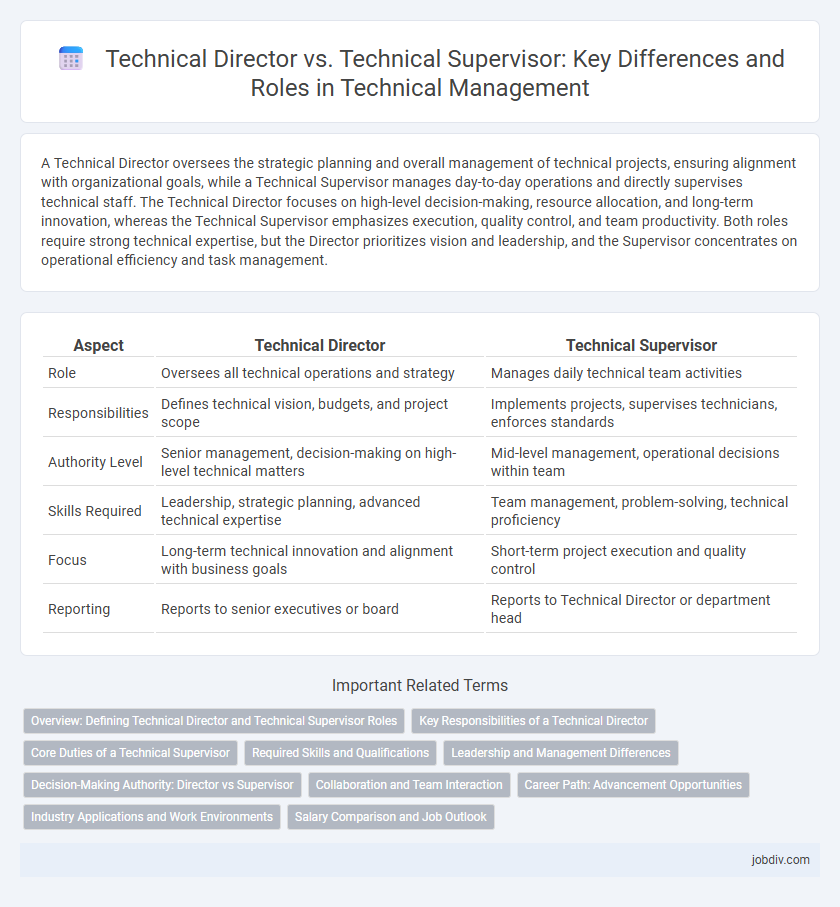A Technical Director oversees the strategic planning and overall management of technical projects, ensuring alignment with organizational goals, while a Technical Supervisor manages day-to-day operations and directly supervises technical staff. The Technical Director focuses on high-level decision-making, resource allocation, and long-term innovation, whereas the Technical Supervisor emphasizes execution, quality control, and team productivity. Both roles require strong technical expertise, but the Director prioritizes vision and leadership, and the Supervisor concentrates on operational efficiency and task management.
Table of Comparison
| Aspect | Technical Director | Technical Supervisor |
|---|---|---|
| Role | Oversees all technical operations and strategy | Manages daily technical team activities |
| Responsibilities | Defines technical vision, budgets, and project scope | Implements projects, supervises technicians, enforces standards |
| Authority Level | Senior management, decision-making on high-level technical matters | Mid-level management, operational decisions within team |
| Skills Required | Leadership, strategic planning, advanced technical expertise | Team management, problem-solving, technical proficiency |
| Focus | Long-term technical innovation and alignment with business goals | Short-term project execution and quality control |
| Reporting | Reports to senior executives or board | Reports to Technical Director or department head |
Overview: Defining Technical Director and Technical Supervisor Roles
A Technical Director oversees the strategic planning, technical standards, and overall execution of projects, ensuring alignment with company goals and innovation benchmarks. A Technical Supervisor manages day-to-day technical operations, directly supervising teams to maintain quality control and adherence to technical specifications. Both roles require strong technical expertise but differ primarily in scope, with the director focusing on high-level decision-making and the supervisor concentrating on operational management.
Key Responsibilities of a Technical Director
A Technical Director oversees the entire technical department, ensuring the integration of technology with organizational goals and managing large-scale projects. They develop strategic plans, allocate budgets, and lead teams to optimize technical performance and innovation. Their role includes maintaining quality standards, coordinating cross-functional collaboration, and driving long-term technology growth initiatives.
Core Duties of a Technical Supervisor
A Technical Supervisor is responsible for overseeing daily technical operations, ensuring team adherence to project specifications, and maintaining quality control standards. They coordinate workflow among technicians, provide hands-on problem-solving support, and monitor equipment performance to optimize productivity. Unlike a Technical Director, the supervisor's core duties emphasize direct team management and execution of technical tasks on the ground level.
Required Skills and Qualifications
Technical Directors require extensive expertise in project management, advanced technical knowledge across multiple engineering disciplines, and strong leadership skills to oversee complex technical operations and guide cross-functional teams. Technical Supervisors need hands-on experience in specific technical areas, proficiency in quality control, and effective communication abilities to directly manage technical staff and ensure adherence to operational standards. Both roles demand problem-solving aptitude and familiarity with industry regulations, but the Director focuses more on strategic planning while the Supervisor emphasizes day-to-day execution.
Leadership and Management Differences
Technical Directors oversee strategic planning and high-level project coordination, ensuring alignment with organizational goals, while Technical Supervisors manage day-to-day operations and direct team performance on specific tasks. Leadership for Technical Directors centers on vision-setting and cross-departmental collaboration, whereas Technical Supervisors focus on hands-on guidance and immediate problem-solving within technical teams. The management scope of a Technical Director includes resource allocation and long-term development, contrasting with the Technical Supervisor's role in task execution and maintaining workflow efficiency.
Decision-Making Authority: Director vs Supervisor
The Technical Director holds strategic decision-making authority, shaping project direction and long-term technical goals, while the Technical Supervisor focuses on executing these decisions through day-to-day team management and operational oversight. Directors are responsible for approving budgets, setting technical standards, and aligning technology initiatives with business objectives. Supervisors ensure compliance with these directives, manage workflows, and resolve immediate technical issues within their teams.
Collaboration and Team Interaction
Technical Directors and Technical Supervisors both play critical roles in project execution, with the former focusing on strategic decision-making and the latter on operational oversight. Collaboration between these roles enhances team interaction by aligning high-level technical goals with day-to-day task management, ensuring seamless communication across engineering teams and stakeholders. Effective teamwork relies on the Technical Director's vision and the Technical Supervisor's hands-on guidance to foster innovation and maintain project timelines.
Career Path: Advancement Opportunities
Technical Directors typically have broader strategic responsibilities and oversee multiple projects or departments, positioning them for executive roles such as CTO or VP of Engineering. Technical Supervisors manage day-to-day operations and team performance, serving as a crucial step for advancing into Technical Director positions. Career advancement from Supervisor to Director often involves gaining leadership experience, mastering project management, and developing strategic planning skills.
Industry Applications and Work Environments
Technical Directors oversee the strategic planning and execution of technology projects in industries such as film production, software development, and telecommunications, ensuring alignment with organizational goals. Technical Supervisors manage day-to-day technical operations and provide hands-on guidance to teams in manufacturing plants, data centers, and construction sites, focusing on maintaining workflow efficiency and adherence to safety standards. The work environment for Technical Directors is often corporate and project-driven, while Technical Supervisors operate in more hands-on, operational settings requiring direct oversight of technical staff.
Salary Comparison and Job Outlook
Technical Directors generally earn higher salaries than Technical Supervisors, with median annual pay ranging from $90,000 to $130,000 compared to $60,000 to $85,000 for supervisors. Job outlook for Technical Directors shows faster growth at around 8% annually due to increased demand for strategic leadership in technology projects, whereas Technical Supervisors have a steadier growth rate near 5%. Both roles require advanced technical expertise, but Technical Directors command greater compensation due to broader responsibilities and decision-making authority.
Technical Director vs Technical Supervisor Infographic

 jobdiv.com
jobdiv.com